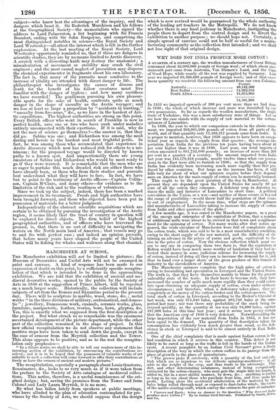THE NEXT ARCTIC VOYAGE.
THAT there will be another Arctic search seems quite certain : the only question is, whether it shall be deferred until some per- sons, who have never been to the Arctic regions, but have an idea that a voyage to those parts is unwholesome and dangerous, shall have got over their panic : the only question is, whether the next search shall take place before every chance of recovering some trace of Sir John Franklin and his party shall have passed away, or whether it shall be postponed till afterwards. The rea- sons why there will be another search are sufficiently, obvious. Great scientific questions offer their most probable solution within that circle ; so long as we have something further to discover in electricity and its cognate phenomena, scientific inquirers will need an investigation on that ground, and the volunteers will offer for the service. The electric telegraph, which is now placing the most distant parts of the civilized world in connexion with each other, is one of the material benefits, so exclusively intelli- gible to some minds, that have resulted from apparently wander- ing inquiries into the impalpable power of electricity ; and who shall say that we have yet exhausted the benefits which that source will yield to mankind? But if the search be conducted soon enough, besides very useful scientific observations, we have a chance of recovering traces of Franklin, of satisfying the mind of man on that point, and even of regaining a portion of the va- luable records which he has almost certainly. left. Whatever may be the dangers of the Arctic circle, they will probably be as great ten years hence as they are now. In that respect, it will be an equal choice between sending out the expedition ten years hence or at present; but the chance of learning something more about Franklin and his observations is decidedly in favour of the pre- sent time.
This is the evident opinion of those who best understand the
subject—who know best the advantages of the inquiry, and the dangers which beset it. Sir Roderick Murchison and his fellows at the Geographical Society—the memorialists who signed the address to Lord Palmerston, a list beginning with Sir Francis Beaufort, ending with Sir John Burgoyne, and comprising the most distinguished notables in science—the Royal Society and Lord Wrottesley—all attest the interest which is felt in the further exploration. At the last meeting of the Royal Society, Lord Wrottesley opportunely reminded us, that if there are dangers in scientific studies, they are by no means limited to Arctic discovery. A scratch with a dissecting-knife may destroy the anatomist ; a miscalculation of movement or stability may crush the civil engineer ; and the most casual neglect of precaution may disperse the chemical experimenter in fragments about his own laboratory. The fact is, that many of the pursuits most conducive to the increase of vitality are attended with direct danger to life. The philanthropist who investigates the causes of disease and death for the benefit of his fellow creatures must live familiar with the' danger of typhus ; and how many sacrifices we have recorded ! The gentleman pursuing his own pleasur- able sports for the sake of health, confronts quite as much danger in the shape of casualty as the Arctic voyager • and we lose at least as large a proportion by " accidents in hunting," " casualty from fire-arms," &c., as we have in the hardest of Arc- tic expeditions. The highest authorities are strong on this point. Every British officer who went in search of Franklin is now in perfect health, save one or two who have sunk under maladies entirely unconnected with their exertions. If it is said, why do not the men of science go themselves ?—the answer is, that they did go. Sabine was one; and Richardson was among the most and heroic in the hardest and most frightful perils. In fact, Ile was among those who accumulated that experience in Arctic discovery which now has reduced risk for others to a mi- nimum; for the proposed voyage would be directed by known paths to a known spot. And unquestionably there are young emulators of Sabine and Richardson who would be most ready to go if they were wanted. It is remarkable that the men who are so eager to partake this much dreaded risk are either those who have already been, or those who from their studies and pursuits best understand what they will have to face. In fact, we have but to point to the testimony of Arctic officers—Captain Collin- son, Captain M'Clure, and many others—for evidence as to the limitation of the risk and to the readiness of volunteers.
Since we took up the subject, indeed, there has been a marked improvement in its treatment. Proofs and high authorities have been brought forward, and those who objected have been put in. possession of materials for a better judgment. Independently of the abstract scientific acquisitions which are certain to be obtained by pursuing the investigation of the Arctic region, it seems likely that the tract of country in question will be explored for direct objects. The firm belief of the highest geographical authorities, and of officers who have traversed the ground, is, that there is no sort of difficulty in navigating the waters on the North main land of America ; that vessels may go to and fro with perfect ease ; and indeed an opinion prevails, that before many years have elapsed the people of the United States will be fishing for whales and walruses along that channel.

































 Previous page
Previous page